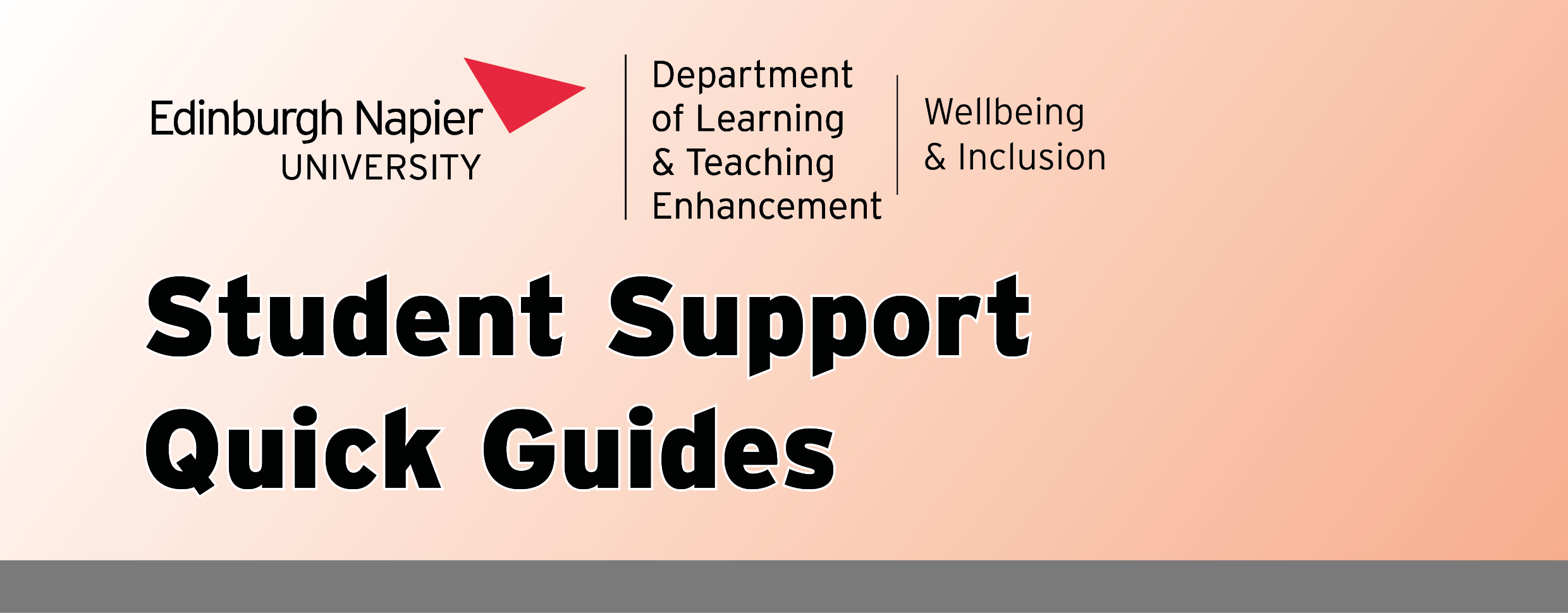
This collection of Quick Guides is designed to ensure staff in all roles can quickly and confidently direct students to the advice and support they need when they need it.
How to use the Quick Guides
It is worth taking some time to familiarise yourself with the Quick Guides. They cover a range of support services, focusing particularly on those services we are most asked about by colleagues. It outlines some of the key signs, cues and behaviours to look out for to help you spot a student who may need additional support. It then provides practical guidance on action you need to take, as well as some future information about what is likely to happen after you take this action. When the guidance refers to a 'student' this refers equally to undergraduate, postgraduate taught and postgraduate research students.
Student Support Services and the support offered by other parts of the University
Some of the kinds of specialist support described in the Quick Guides are self-contained in nature. For example, advice on visas and immigration issues should only be offered to students by colleagues in Visa and International Support, and professional mental health support or counselling should only be offered by colleagues in Wellbeing & Inclusion. The Quick Guides should help you to clarify the boundaries of your own role in supporting students and help you to avoid inadvertently straying into offering types of advice which should be coming from the University's specialist, professional practitioners.
In other cases, alongside the specialist support they are accessing from us, students may require academic support, learning and teaching adjustments, and general pastoral support from you and your teams. For example, most disabled students, in addition to the advice, access to funding and support provided by Disability & Inclusion, will also require learning and teaching adjustments to be made in teaching sessions. In cases like this, remember that specialist practitioners are also here to provide you with advice on what you can or should do.
We welcome your feedback about the Quick Guides and will be reviewing and growing this collection, so it becomes your essential reference point for all the information you need about Student Support. For further information or to provide feedback about the Guides, please contact
dlte@napier.ac.uk
 A student needs support with developing their Academic & Study Skills - Student Support Quick Guide
A student needs support with developing their Academic & Study Skills - Student Support Quick Guide
 A student needs help with finances - Student Support Quick Guide
A student needs help with finances - Student Support Quick Guide
 A student is considering leaving the University - Student Support Quick Guide
A student is considering leaving the University - Student Support Quick Guide
 A student is considering a course transfer - Student Support Quick Guide
A student is considering a course transfer - Student Support Quick Guide
 A student would like some support with homesickness - Student Support Quick Guide
A student would like some support with homesickness - Student Support Quick Guide
 A student is unexpectedly missing - Student Support Quick Guide
A student is unexpectedly missing - Student Support Quick Guide
 A student has a communicable or notifiable disease - Student Support Quick Guide
A student has a communicable or notifiable disease - Student Support Quick Guide
 A student has a query related to faith, belief or religion - Student Support Quick Guide
A student has a query related to faith, belief or religion - Student Support Quick Guide
 When a student has died - Student Support Quick Guide
When a student has died - Student Support Quick Guide
 You have a significant concern about a student's wellbeing - Student Support Quick Guide
You have a significant concern about a student's wellbeing - Student Support Quick Guide
 A student has a disability, dyslexia, a medical or mental health condition - Student Support Quick Guide
A student has a disability, dyslexia, a medical or mental health condition - Student Support Quick Guide
 A student reports discrimination, victimisation or harassment - Student Support Quick Guide
A student reports discrimination, victimisation or harassment - Student Support Quick Guide
 A student is at risk of harm, abuse or neglect - Student Support Quick Guide
A student is at risk of harm, abuse or neglect - Student Support Quick Guide
 A student has a mental health or emotional difficulty - Student Support Quick Guide
A student has a mental health or emotional difficulty - Student Support Quick Guide
 A student is a victim of crime - Student Support Quick Guide
A student is a victim of crime - Student Support Quick Guide
 A student reports a sexual assault - Student Support Quick Guide
A student reports a sexual assault - Student Support Quick Guide
 A student is trans/transgender and is seeking advice and support - Student Support Quick Guide
A student is trans/transgender and is seeking advice and support - Student Support Quick Guide